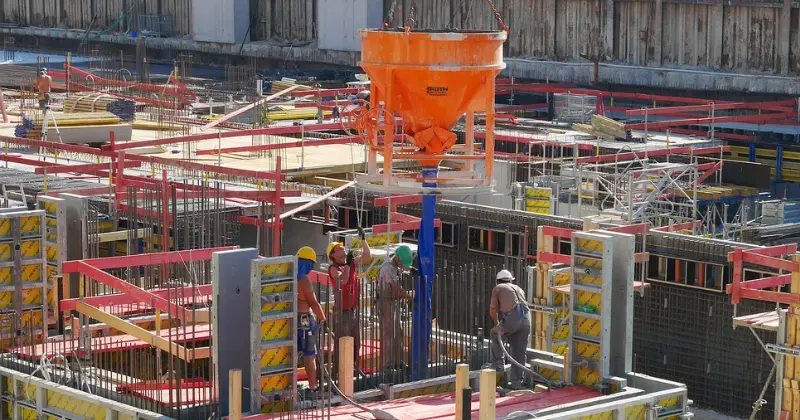11 mins read
Exploring the Role of Quantity Surveyor in Construction Projects

The construction industry is growing more complex daily as new technologies and job roles emerge. At RIB Software, we are committed to providing the best software solutions in the market and educating people about the different elements that compose it.
As a part of that mission, we have been putting together a series of blog posts that do a deep dive into the different construction roles, describing their skills, responsibilities, challenges, salary, and much more. We have already discussed the roles of a construction project manager and a construction manager. Today is the turn of the quantity surveyor.
Keep reading to learn everything about this interesting role!
What is a Quantity Surveyor?
A Quantity Surveyor (QS) is a construction professional who manages the costs and quality of a building project. They are responsible for managing contracts, expenses, material sourcing, legalities, and other aspects to ensure the successful completion of the project.
The importance of this role lies mainly in the need for accurate and efficient construction cost estimation and management. However, as years have passed, the profession has mutated into a more complex role that touches every project stage. Today, a professional QS works from the initial stages of the project, helping clients and contractors during budgeting, quantity takeoff, and tendering, all the way to monitoring and optimizing ongoing costs during the building process. Additionally, a QS will ensure that the project meets the expected quality and legal standards to prevent costly disputes, resulting in a successful project with a high ROI.
Contractor QS vs. Client QS
Depending on the level of experience and knowledge, a QS will work on a specific area of the project or become an overall advisor to the parties on cost estimation, budgeting, procurement, tendering, and more. That said, the role changes from the client’s and the contractor’s perspective.
A contractor QS works on behalf of the contractor. They will spend most of their time overseeing subcontractors and collaborating with project specialists on the building site. Conversely, a client QS helps the project owner budget and estimate costs. They work closely with engineers and architects to produce the tendering package of a project, including the bill of quantities, drawings, specifications, and others.
Client QS is often considered a “cleaner” version of the profession, as on-site visits are less frequent. However, the experience of on-site quantity surveying is very valuable when transitioning into the client side of things.
During the project, contractors and client QS will collaborate to negotiate a final settlement and manage the different project stages and tasks.
What Does a Quantity Surveyor Do?
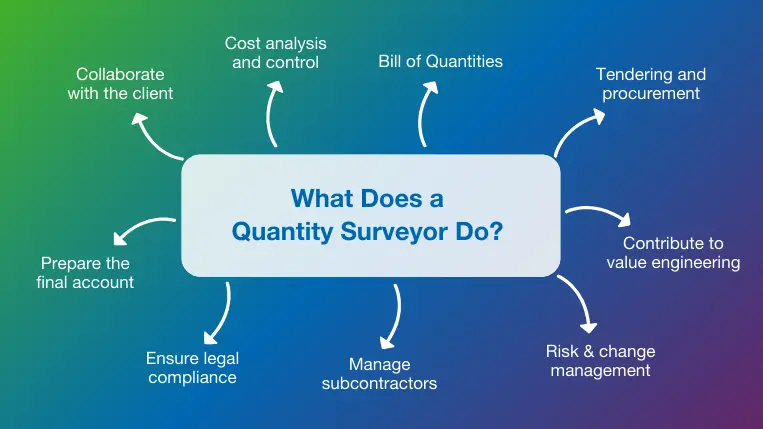
The responsibilities of a QS vary depending on which side of the project they are working on, for the client or the contractor. As mentioned, a client’s QS (also known as a consultant or private QS) will advise and assist the client in several processes throughout the entire project. Conversely, a contractor’s QS is more focused on overseeing the project from the site. That said, some typical tasks are associated with quantity surveyors; let’s explore them below!
Collaborate with the client
At the early stages of a project, a QS meets with the client to understand the goals and objectives. This also involves carrying out a feasibility study to see if the proposed work is viable in terms of cost, time, and resources. If some issues are found, the QS can provide expert advice to ensure the client’s vision can be brought to life in a realistic way.
Cost analysis and control
Another key responsibility of quantity surveyors is performing cost analysis and cost control in construction projects. This starts with analyzing specifications, drawings, cost databases, and other relevant information to accurately estimate the costs of materials, labor, equipment, and other components. They then use this data to monitor costs against the budget throughout the project. If any issues or discrepancies arise, they propose cost-effective solutions to ensure profitability.
Bill of Quantities
One of the most important tasks of a QS is preparing the Bill of Quantities (BoQ). This fundamental document outlines the items of work needed to complete the project, with quantities, unit rates, and costs for each item. A BoQ is a fundamental document for tendering, and it is included in the tender package to help bidders price their work fairly.
Tendering and procurement
QS assists in the tendering and construction procurement processes by preparing critical documentation, soliciting and evaluating bids, and selecting and negotiating contracts with suppliers and contractors. The negotiation process is of utmost importance as the QS uses its negotiation skills to get the best deals in terms of pricing, timelines, and project goals.
Contribute to value engineering
Paired with cost estimation and control, the QS contributes to construction value engineering by analyzing financial data and developing cost-effective solutions that don’t affect the project’s quality or functionality. These include researching alternative materials, construction methods, or design changes.
Risk & change management
To keep the project on budget and schedule, the QS needs to carry out smart construction risk management strategies to not only identify potential risks and analyze their potential implications but also to develop smart mitigation strategies that ensure the project remains profitable and on course. This also includes managing any changes and negotiating the terms of the changes with suppliers and contractors.
Manage subcontractors
The responsibility of subcontractor management is for the contractor’s QS. They oversee and value the work carried out by subcontractors to ensure quality and schedule adherence. These also involve managing and negotiating change orders efficiently and effectively.
Ensure legal compliance
As industry experts, quantity surveyors are responsible for ensuring the project complies with relevant legal and regulatory requirements. These include compliance with building codes and permits, health and safety regulations, and contract laws, among other things. This task is of the utmost importance as non-compliance can lead to fines or legal issues affecting the entire project.
Prepare the final account
At the final stages of the project, the QS works on the final accounts to prepare for handover. The final account marks the end of the financial agreement between the contractor and the client, and it involves the reconciliation of actual costs and estimated costs, variations, change orders, and other factors to get an accurate representation of the project’s financial performance and settle financial obligations.
Key Quantity Surveyor Skills
To perform all of the aforementioned responsibilities, quantity surveyors require a set of skills that mix technical knowledge about the industry but also soft skills like communication and problem-solving. We have already dived deep into this topic in our blog post about quantity surveyor skills, so you can go there to read more about it, but here is a rundown to get you started:
- Written and verbal communication skills to collaborate with project stakeholders and communicate critical information effectively
- Numeracy and financial skills to analyze and manage project costs
- A data-driven mind to be able to make sense of project data
- Critical thinking to spot issues and come up with smart solutions
- Attentive to detail to ensure every aspect is considered for better results
- Technology-driven to be able to use various quantity surveyor software and technologies to benefit the project
- Time management skills to be able to meet deadlines under pressure and come up with smart schedules
- Negotiation skills to manage contracts confidently and in a way that benefits both parties
- Industry knowledge to understand how processes are carried out and which best practices to apply
- Teamwork capabilities to collaborate smoothly with all project teams and avoid costly misunderstandings
How to Become a Quantity Surveyor?
As you have learned, quantity surveyors have numerous and varied duties and responsibilities. These professionals must be skilled in several areas to successfully complete these tasks. But how do you actually gain all this knowledge and become a successful QS?
Education
Quantity surveying is generally open to professionals from varied backgrounds. You can have a bachelor’s degree in civil or structural engineering, construction, economics, geography, mathematics, or land studies. In the UK, it is better if the RICS officially recognizes your degree, as it can help you get chartered more easily.
If you don’t have a related degree, you can opt for a postgraduate degree in quantity surveying, construction, or engineering. Some professionals also apply for an apprenticeship and split their time between training and working. For example, a surveying technician apprenticeship is a great way to start your journey into becoming a surveyor.
The last step to becoming a fully qualified chartered surveyor is to apply for a RICS membership (MRICS). To do so, you’ll need to complete the Assessment of Professional Competence by RICS, which lasts two years, where you’ll have to show your expertise and complete a set number of hours of continuing professional development (CPD). Surveyors with substantial experience can skip the training and go straight to the final assessment.
Professional experience
Quantity surveyors can also get excellent positions based solely on their experience, even without formal education. They can start working on a construction site or at an architecture firm and transition into a QS role once they gain enough field experience. Naturally, a related degree will considerably increase your chances of finding a job, but knowledge is highly valued in the construction industry.
What is the Average Quantity Surveyor Salary?
Like any position in construction or another industry, the salary will depend on the country, qualifications, skills, and experience. Other factors that can influence a QS salary include the type of employer (contractor or client) or if the person is a chartered surveyor. That said, an average salary for each country gives applicants an idea of what they could earn as a QS. To this date, the average salary in the UK is £50,372 ($65,750) and $98,917 in the USA.
What Challenges Do Quantity Surveyors Face
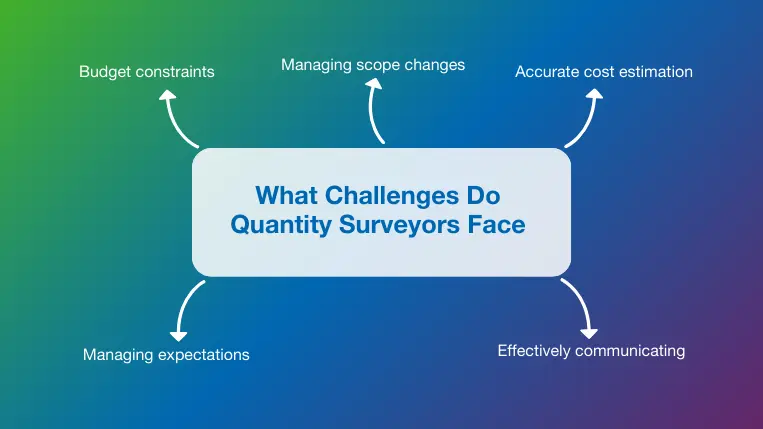
As you’ve learned by now, the role of quantity surveyors is complex and has a lot of responsibilities. Unfortunately, with responsibilities comes challenges, and even the most experienced QS can sometimes face them. A good way to mitigate these challenges is to be aware of them early on.
- Budget constraints: One of the biggest challenges QS faces in their daily work is finding cost-effective solutions without compromising the quality of the project. This is where their experience needs to quick in to find alternative solutions that work.
- Managing scope changes: While scope changes are almost inevitable in construction projects, they still present a challenge for quantity surveyors as they often impact the budget and the schedule. That is where these professionals need to shine, ensuring changes are reflected in estimates and budgets and that any stocks are mitigated.
- Accurate cost estimation: This is a challenge that happens especially in larger projects, where the QS needs to consider the costs of labor, materials, equipment, market fluctuations, timelines, and more to ensure accurate estimates. This is a hard job, especially when estimating the traditional way, as errors can occur. Luckily, professional construction estimating software is available to automate the process and ensure high levels of accuracy.
- Effectively communicating: Communicating financial, progress, and other data to stakeholders in the changing landscape of a construction project can be challenging for the QS. Relying on professional construction analytics software is fundamental to ensure all data is tracked and shared in real-time. More on this later in the post!
- Managing expectations: As mentioned throughout the post, QS works with various stakeholders to ensure project success. Managing the expectations of all of them can become challenging as the goals and priorities of each are different. That is why ensuring smooth collaboration and communication is paramount, as it helps keep everyone on the same page.
What Software Do Quantity Surveyors Use?
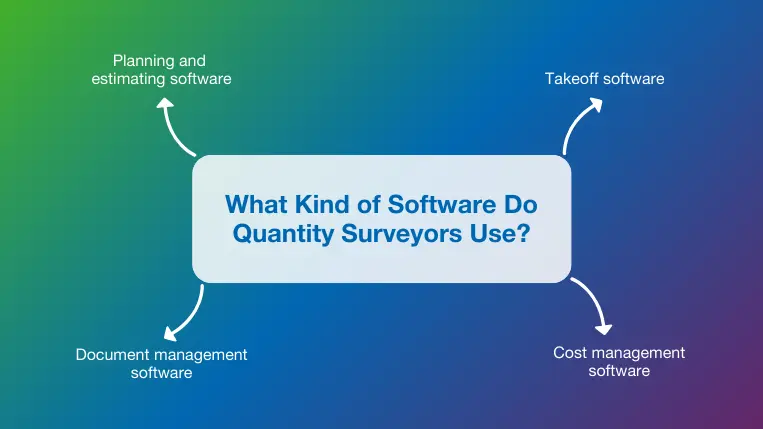
To solve the challenges mentioned above and others that come with our complex industry, quantity surveyors need to rely on the right technology and tools. Innovative software solutions help boost the performance of several processes thanks to automation and a digital environment. Below, we explore the main tools quantity surveyors use for their job.
Planning and Estimating Software
Quantity surveyors oversee several aspects of project planning. One of the most crucial ones is cost estimation. Traditionally, this task was done manually, referring to drawings and infinite spreadsheets that left room for a lot of manual errors. Today, this is no longer possible due to the fast-paced nature of the construction industry, where estimates must be done quickly and accurately with the help of specialized software.
RIB Candy is a great example of such a solution. Our state-of-the-art planning and estimating platform has a user-friendly interface that makes the estimating process more accurate and agile than ever before.
Key features such as electronic pricing templates, multi-user functionality, and the ability to integrate estimates with the project program make Candy the best partner to increase the efficiency and accuracy of estimates for better project outcomes.
Takeoff Software
Construction takeoffs are crucial for accurate cost estimation. Similarly to estimates, takeoffs were traditionally done manually, counting each element directly from drawings and blueprints. This method is not feasible anymore, not only because of the risk of errors that can increase project costs but also because of the time-consuming nature of the task. For that reason, quantity surveyors rely on professional takeoff software to digitalize and automate the process.
RIB CostX is an innovative BIM takeoff software that supports multiple design document formats, including scans, PDFs, CAD files, and BIM files, to digitize the takeoff process and make it faster and more accurate.
A revision tracking mode highlights changes in the design that are automatically reflected in the takeoff, avoiding any mistakes that can lead to costly reworks. Any changes are recorded with an audit trail for full transparency and analysis.
Cost Management Software
As you learned in the responsibilities section of the blog, the QS oversees several aspects of cost management throughout the project. To do so successfully, they support themselves with cost management software to ensure all relevant data is visible in a single location and ready for decision-making.
An example of these powerful solutions is RIB BuildSmart. Our powerful cost management and enterprise accounting software offers a centralized hub for construction companies seeking to improve their project’s financial performance with the help of data.
The platform’s cost control and reporting feature makes it possible to compare actual costs with budgets in real-time, allowing for timely interventions that protect project profitability.
Document Management Software
Professional document management software is one of the biggest allies of a quantity surveyor. These professionals manage a wide range of documentation that needs to be stored in a secure location and be easily accessible to the different project stakeholders. This has never been easy, as keeping documentation updated is challenging. Luckily, the digital environment of modern document management solutions makes it easier to update and share documents, boosting collaboration and preventing misunderstandings.
RIB CX is a powerful web-based construction software that offers a single source of truth for all project data and documentation, keeping all teams connected and collaborating.
Amongst its many valuable features, the platform offers a Publication Space module that allows teams to share files, reports, schedules, drawings, contracts, and much more in a secure and automated way.
Final Thoughts
As we reach the end of this insightful guide, we hope you have a deeper understanding of the quantity surveyor role and how it is becoming increasingly important for the success of a construction project. These experienced professionals bring their experience and expertise into all project phases, collaborating with the different teams to ensure the work is completed on time and, most importantly, within budget.
Professional construction software solutions play a key role in the day-to-day operations of a quantity surveyor. They help streamline several processes to ensure better results in significantly less time. Choosing the right solution is paramount in that sense, as technology can become a huge competitive advantage.
At RIB Software, we have decades of experience developing innovative solutions tailored to the needs of professionals in the construction industry. If you want to know what we have on offer and how it can benefit your organization, get a free demo of RIB’s toolkit today!
Most Recent
11 mins read
10 mins read
10 mins read
29 mins read
Blog Categories
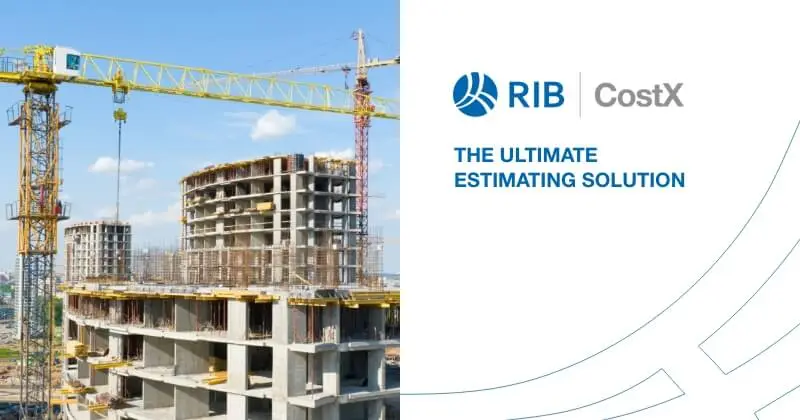
Ebook



